Fiber's Role in a Healthy Gut
Fiber's Role in a Healthy Gut isn't just a feeling. It's a 2 way street between your mind and your second brain in the gut. Nurture your gut, nurture your mind.
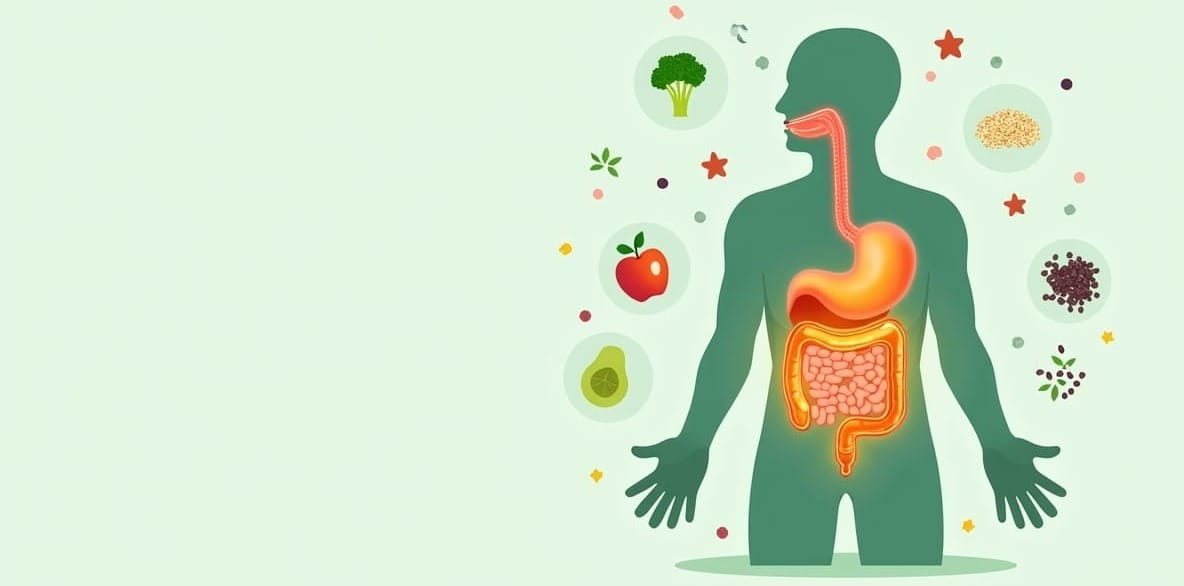
Beyond Regularity: Why Fiber is a Superhero for Your Gut
When you think of fiber, you probably think of staying "regular." While that's certainly a key benefit, the role of fiber in your digestive system goes far beyond just preventing constipation. Dietary fiber is a powerhouse for your entire body, acting as a crucial food source for the "good" bacteria in your gut and serving as a shield against numerous health issues.
This article will break down exactly why fiber is a digestive health hero and how you can get more of it, whether from food or supplements.
The Two Types of Fiber and Why You Need Both
Not all fiber is created equal. Understanding the two main types is key to a balanced diet:
- Soluble Fiber: This type dissolves in water and forms a gel-like substance in your gut. It helps slow down digestion, which can help regulate blood sugar levels and keep you feeling full for longer. It also binds to cholesterol, helping to remove it from your body. You can find it in oats, beans, apples, and carrots.
- Insoluble Fiber: Also known as "roughage," this type does not dissolve in water. It acts like a broom, adding bulk to your stool and helping waste move through your digestive tract more efficiently. This is the type of fiber that prevents constipation. You can find it in whole grains, nuts, and the skins of fruits and vegetables.
Why Fiber is So Important for Your Gut
Your gut is home to trillions of microorganisms, and the beneficial ones thrive on fiber. When you eat fiber, these gut bacteria ferment it, producing beneficial compounds called short-chain fatty acids (SCFAs). These SCFAs are vital for maintaining a strong gut lining, reducing inflammation, and even influencing your metabolism and immune system. A diet low in fiber starves these friendly microbes, leading to an imbalance that can contribute to a host of health problems.
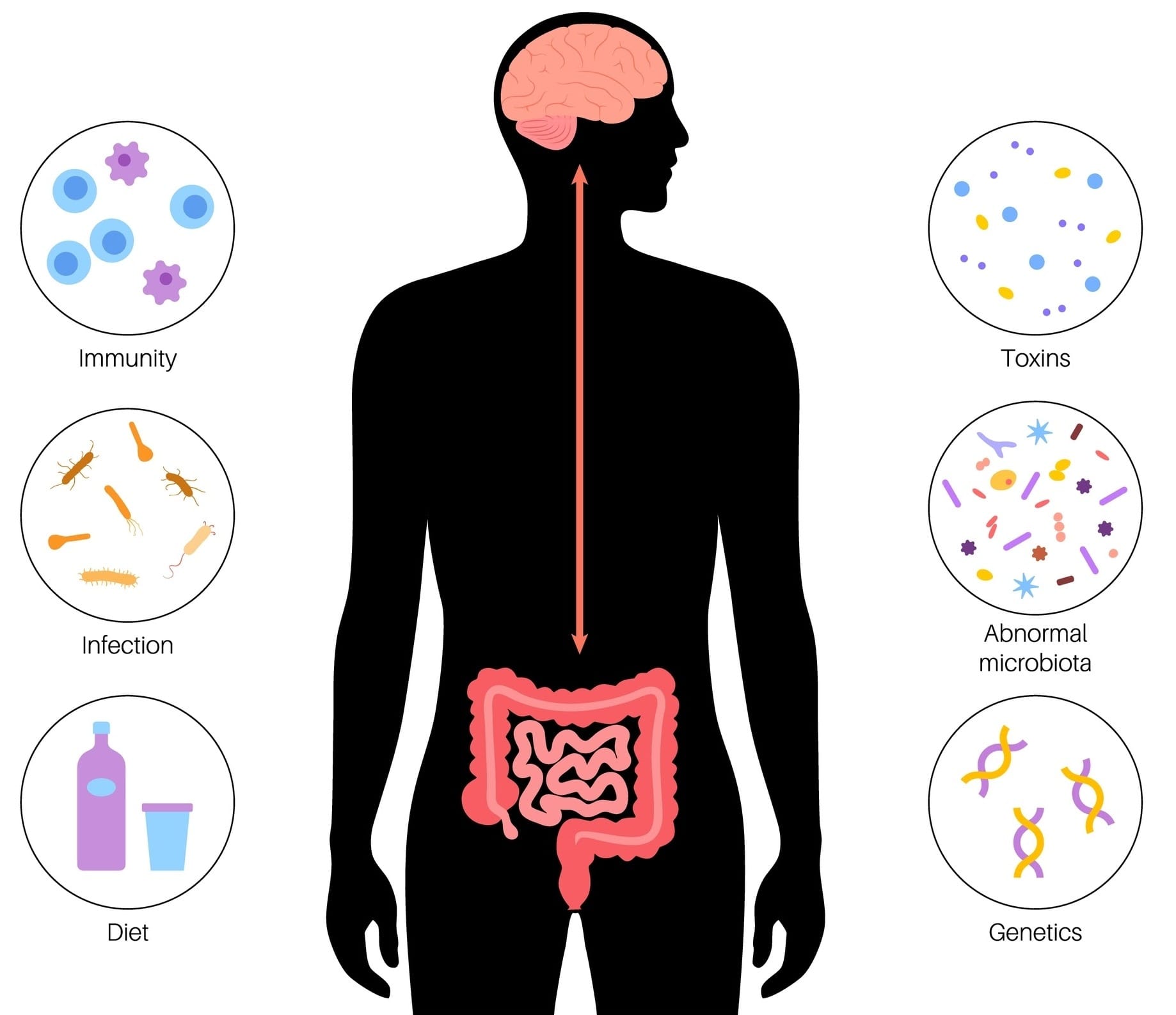
Licensed by Google
Top 5 Fiber Supplements
For many people, meeting the recommended daily fiber intake (25-38 grams) from food alone can be challenging. Fiber supplements offer a convenient way to bridge this gap. Here are five top-ranking products on Amazon, with their pros, cons, and editor's choice.
Metamucil Psyllium Fiber Supplement
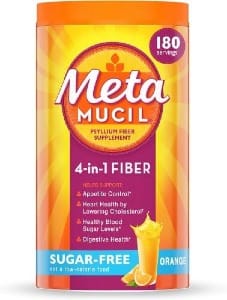
- Pros: A well-known brand with a long history. Contains psyllium husk, a highly researched soluble fiber that is effective for both constipation and diarrhea. It's often recommended by doctors.
- Cons: The powder can thicken quickly and has a chalky taste. Some users may experience bloating or gas, especially when first starting.
Citrucel Methylcellulose Fiber Therapy Caplets
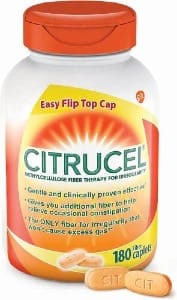
- Pros: This is a non-fermenting fiber, meaning it's less likely to cause gas and bloating for people with sensitive stomachs. It comes in a convenient, mess-free caplet form.
- Cons: It's more expensive per serving than powdered options. It does not provide the prebiotic benefits of a fermentable fiber.
Benefiber Original Prebiotic Fiber Powder
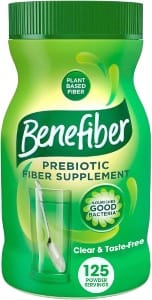
- Pros: This powder dissolves completely in most liquids, so it won't change the texture or taste of your drink. It's an excellent prebiotic fiber that feeds good gut bacteria.
- Cons: It may not be as effective for people needing significant stool-bulking to combat constipation. Some people find that the prebiotic effect can lead to temporary gas.
Garden of Life Raw Organic Fiber Powder
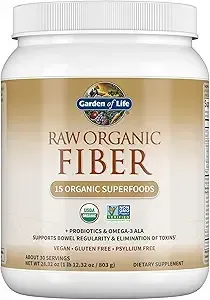
- Pros: A whole-food, plant-based supplement with a mix of soluble and insoluble fiber from organic seeds and grains. It provides both prebiotic and antioxidant benefits.
- Cons: The texture can be gritty, and some find the taste unpleasant. It's generally more expensive than synthetic options.
Viva Naturals Organic Psyllium Husk Powder
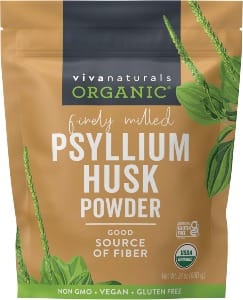
- Pros: A natural, single-ingredient food source of fiber that also provides beneficial omega-3 fatty acids. It's easy to add to smoothies, oatmeal, and baked goods.
- Cons: It must be stored in the refrigerator to maintain freshness. It's less convenient than a powder or capsule for on-the-go use.
Editor's Choice: Metamucil Psyllium Fiber Supplement. It's the most researched and clinically backed fiber supplement, proven to be effective for a wide range of digestive issues. While the texture can be a downside for some, its reliable results make it the top choice for anyone looking for a dependable and affordable way to boost their fiber intake.
Frequently Asked Questions
Q1: How much fiber should I eat per day?
A: Dietary fiber is one of the most important (and often overlooked) parts of a healthy diet. It not only supports good digestion, but also helps regulate blood sugar, lower cholesterol, and even supports a healthy gut-brain connection.
Daily Fiber Recommendations
- Women: About 21–25 grams per day
- Men: About 30–38 grams per day
(Source: U.S. Dietary Guidelines & Mayo Clinic)
Unfortunately, most people consume 15 grams a day, below the recommended amount.
Types of Fiber You Need
- Soluble fiber – dissolves in water to form a gel-like substance. It slows down digestion, helps regulate blood sugar, and lowers cholesterol.
- Found in: oats, apples, beans, carrots, flaxseed.
- Insoluble fiber – adds bulk to stool and helps food move through the digestive system. It prevents constipation and promotes regularity.
- Found in: whole grains, nuts, vegetables, and wheat bran.
Tips to Increase Fiber Intake
- Choose whole fruits and vegetables instead of juices.
- Swap white bread, rice, or pasta for whole-grain versions.
- Add beans, lentils, or chickpeas to soups and salads.
- Snack on nuts, seeds, or air-popped popcorn instead of processed snacks.
- Start slow—too much fiber at once can cause bloating or gas. Increase gradually and drink plenty of water.
Why Fiber Matters Beyond Digestion
- Supports healthy gut bacteria, which may improve mood and immunity.
- Helps with weight management by promoting satiety.
- Reduces the risk of chronic diseases like type 2 diabetes, heart disease, and colon cancer.
👉 Bottom line: Most adults should aim for 25–35 grams of fiber daily from a variety of whole foods. Think of it as a mix of soluble and insoluble fiber spread throughout the day. Start small, build up gradually, and your gut (and overall health) will thank you.
Q2: Is too much fiber a bad thing?
A: Fiber is one of the most important parts of a healthy diet — it supports digestion, regulates blood sugar, lowers cholesterol, and keeps you feeling full. However, like many good things, too much fiber can cause problems if your body isn’t used to it or if you go far above the recommended daily intake.
What happens if you eat too much fiber?
- Digestive discomfort – Common symptoms include bloating, gas, cramping, and constipation (especially if you don’t drink enough water).
- Interference with nutrient absorption – Excess fiber can reduce the body’s ability to absorb minerals like iron, zinc, calcium, and magnesium.
- Diarrhea or loose stools – Soluble fiber holds water in the gut, and too much can speed up bowel movements.
- Worsening of certain conditions – For people with IBS, Crohn’s disease, or other digestive issues, a sudden increase in fiber may aggravate symptoms.
How much fiber is “too much”?
The general recommendation is about 25 grams per day for women and 38 grams for men (according to the U.S. Dietary Guidelines). Going a little over is usually fine, but consistently doubling or tripling that amount (say, 70–80 grams daily) may cause issues unless your body is well adapted.
How to balance fiber intake
- Increase gradually – Don’t jump from 10g to 40g in one day. Add fiber slowly so your gut bacteria can adjust.
- Stay hydrated – Fiber needs water to move smoothly through your system. Without enough fluids, constipation is more likely.
- Mix types of fiber – A balance of soluble (oats, beans, apples) and insoluble (whole grains, veggies, nuts) supports both digestion and gut health.
- Listen to your body – Everyone’s tolerance is different. If you feel bloated or constipated, scale back and reintroduce fiber more gradually.
Fiber is essential — but moderation and balance matter. For most people, the risk is not eating enough fiber, rather than too much. Still, if you’re suddenly eating large amounts of fiber-rich foods or supplements and notice discomfort, it’s a sign to slow down, drink more water, and adjust your diet.
Q3: What's the best time to take a fiber supplement?
A: The best time to take a fiber supplement depends a little on your health goals, your routine, and the type of fiber you’re using. Fiber is an important part of digestion and gut health, but supplements (like psyllium husk, inulin, or methylcellulose) can behave differently than fiber from whole foods. Here are some practical guidelines:
1. Morning vs. Evening
- Morning: Many people prefer taking fiber in the morning with breakfast. This helps regulate digestion throughout the day and can keep you feeling full longer, which may support weight management.
- Evening: Taking it at night can also work, especially if you’re targeting regularity and want it to “work” by the next morning. However, some people may experience mild bloating or gas at night.
2. Timing Around Meals
- With meals: Taking fiber with food can slow digestion slightly, helping stabilize blood sugar and improve satiety. If your goal is to manage appetite or blood sugar levels, this is often the best time.
- Between meals: If you’re using fiber for digestive regularity, between meals can also work — just make sure you drink plenty of water.
3. Hydration Matters
Fiber supplements, especially psyllium husk, need plenty of water to work properly. Without enough fluids, they can cause constipation instead of preventing it. A good rule is at least one full glass of water (8 oz / 250 ml) with your supplement, plus extra fluids throughout the day.
4. Medication Timing
If you’re taking other medications or supplements, it’s best to separate fiber by at least 2 hours. Fiber can sometimes bind to medications and reduce absorption. Always check with your doctor if you’re on prescription meds.
5. Consistency Over Timing
Ultimately, the most important thing is to take fiber supplements consistently at a time that fits your lifestyle. Whether it’s morning, midday, or evening, what matters is that you make it a routine and pair it with proper hydration and a balanced diet.
👉 The best time to take a fiber supplement is the time you’ll remember to take it consistently. With meals is a good default, especially if your goal is satiety or blood sugar support, but for regularity, anytime works — just drink plenty of water.
Q4: What are some examples of high-fiber foods?
A: High-fiber foods are essential for good digestion, heart health, blood sugar control, and even weight management. Most adults need 25–35 grams of fiber daily, yet many fall short. Fiber comes in two main types:
- Soluble fiber – dissolves in water, helps lower cholesterol and blood sugar.
- Insoluble fiber – adds bulk to stool, supporting regular bowel movements.
Here are some great high-fiber food examples, grouped by category:
1. Fruits
- Apples (with skin) – about 4g per medium apple
- Pears – around 5–6g per medium pear
- Berries (raspberries, blackberries, blueberries) – 4–8g per cup
- Bananas – about 3g per medium banana
- Avocados – roughly 10g per whole avocado
👉 These are easy snacks and also work well in smoothies or salads.
2. Vegetables
- Broccoli – 5g per cup (cooked)
- Carrots – 3.5g per cup (raw)
- Brussels sprouts – 4g per cup
- Sweet potatoes (with skin) – about 5g per medium potato
- Spinach and kale – 3–4g per cooked cup
👉 Eating a variety of colorful veggies ensures you get both soluble and insoluble fiber.
3. Legumes
- Lentils – 15g per cup (cooked)
- Chickpeas – 12g per cup (cooked)
- Black beans – 15g per cup (cooked)
- Kidney beans – 13g per cup (cooked)
- Split peas – 16g per cup (cooked)
👉 These are some of the richest fiber sources. Great for soups, curries, and salads.
4. Whole Grains
- Oats – 4g per cup (cooked)
- Quinoa – 5g per cup (cooked)
- Brown rice – 3.5g per cup (cooked)
- Barley – 6g per cup (cooked)
- Whole wheat bread/pasta – 2–3g per slice or serving
👉 Swap refined grains for whole grains whenever possible.
5. Nuts & Seeds
- Chia seeds – 10g per ounce (2 tablespoons)
- Flaxseeds – 8g per ounce
- Almonds – 3.5g per ounce
- Pistachios – 3g per ounce
- Sunflower seeds – 3g per ounce
👉 Perfect for topping yogurt, oatmeal, or salads.
✅ Quick Tips to Add More Fiber Daily:
- Start your day with oatmeal topped with berries and chia seeds.
- Snack on fruit with the skin on instead of fruit juice.
- Add beans or lentils to soups, stews, or salads.
- Replace white rice or bread with brown rice or whole wheat versions.
- Keep a handful of nuts or seeds for a fiber-rich snack.
Bottom line: Eating a mix of fruits, vegetables, legumes, whole grains, nuts, and seeds makes it easy to hit your daily fiber needs. Your gut, heart, and overall health will thank you!
Q5: Can fiber supplements cause bloating and gas?
A: Yes, fiber supplements can cause bloating and gas — especially if you start them suddenly or take more than your body is used to. Here’s why and what you can do about it:
Why Fiber Causes Gas and Bloating
- Fermentation in the gut – Certain fibers (like inulin, wheat dextrin, or psyllium) are fermented by gut bacteria in the large intestine. This process produces gas, which can lead to bloating, cramping, or flatulence.
- Sudden increase – If your body isn’t used to high-fiber intake, your digestive system needs time to adjust. A sudden jump can overwhelm your gut microbes.
- Type of fiber matters – Soluble fiber (like psyllium husk) holds water and forms a gel, which can slow digestion and sometimes cause fullness. Insoluble fiber (like wheat bran) adds bulk but moves faster through the gut. Some people are more sensitive to one type than the other.
How to Reduce Bloating from Fiber Supplements
- Start low and go slow: Begin with a small dose and gradually increase over a few weeks.
- Stay hydrated: Drink plenty of water — fiber absorbs fluid, and without enough, it can worsen bloating or constipation.
- Choose the right supplement: Psyllium husk is often well-tolerated. Inulin and certain synthetic fibers may cause more gas for some people.
- Pair with whole foods: Combining supplements with a fiber-rich diet (fruits, vegetables, legumes, whole grains) helps your gut adapt more smoothly.
- Listen to your body: If a particular fiber supplement consistently causes discomfort, try a different type.
When to See a Doctor
If bloating, pain, or changes in bowel habits are severe or persistent, it’s worth consulting a healthcare professional. Sometimes symptoms may be related to conditions like IBS, food intolerances, or other digestive disorders.
Fiber supplements can cause temporary bloating and gas, but with gradual introduction, proper hydration, and the right fiber choice, most people find them beneficial for digestion, regularity, and long-term gut health.
Key Takeaways
Ultimately, understanding the gut-brain connection is about recognizing your body's incredible interconnectedness. It's a powerful reminder that what you eat and how you manage stress have a ripple effect far beyond your digestive system. By prioritizing a fiber-rich diet, considering a high-quality supplement, and listening to your gut, you’re not just supporting your digestion—you’re investing in a healthier mind, a stronger body, and a happier you.
